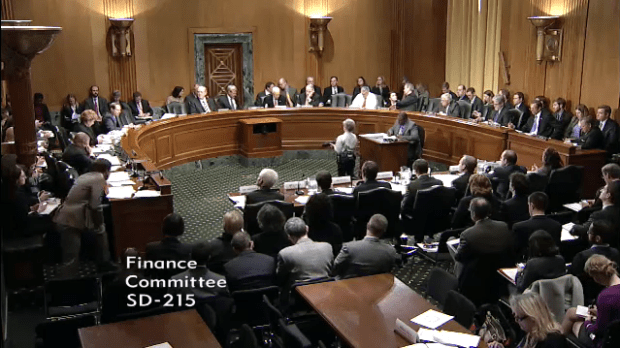The Senate Finance Committee is currently marking up what lawmakers have christened the "Highway Investment, Job Creation and Economic Growth Act of 2012," the final component of the Senate's two-year transportation bill. This portion of the bill, put together by committee chair Max Baucus (D-MT), is responsible for the "pay-for" -- identifying approximately $13 billion in funding needed to align the bill's spending with its revenue. As of yesterday the committee had announced only a little more than $10 billion in "found" revenue.

Today (very early in the morning, as his Republican colleagues pointed out), Baucus released an updated version of the bill, which incorporates several proposed amendments -- including Senator Chuck Schumer's transit benefits amendment, which would raise the maximum tax benefit for commuters who take transit so that it's equal to the benefit for commuters who drive.
Baucus also revealed additional sources of funds and how they'd be used:
- $2.618 billion transferred from import tariff revenue (essentially a transfer from the general fund) would ensure the Highway Trust Fund would be fully-funded over the life of the bill
- $6.505 billion added to the general fund over ten years by closing various tax loopholes
- $0.710 billion in new spending over ten years, mostly in new tax breaks, including parity between the pre-tax commuter parking and transit benefits
The addition of transit commuter benefits is good but frustrating news for transit. While the Senate continues include a few forward thinking reforms on transit policy, the House bill's extremist slant poses a threat to the entire reauthorization effort.
In remarks before the markup votes began, Republicans voiced their concerns about budget offsets that "do not have anything to do with transportation," in the words of Richard Burr (R-NC). Tom Coburn (R-OK), Mike Enzi (R-WY) and Burr even expressed measured interest in indexing the federal gas tax to inflation.
On the Democrats' side, John Kerry (D-MA) reiterated his support for a national infrastructure bank capitalized by a $10 billion in federal investment. But Kerry indicated he would not attempt to insert the infrastructure bank into this bill.
The bill is expected to pass the Democrat-controlled committee; the big remaining question is whether it will pass with the same bipartisan support that the EPW and Banking segments of the transportation bill received.
A live webcast of the markup is available here.





